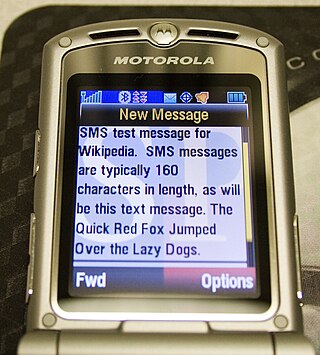Related Research Articles

Short Message/Messaging Service, commonly abbreviated as SMS, is a text messaging service component of most telephone, Internet and mobile device systems. It uses standardized communication protocols that let mobile devices exchange short text messages. An intermediary service can facilitate a text-to-voice conversion to be sent to landlines.
Short Message Peer-to-Peer (SMPP) in the telecommunications industry is an open, industry standard protocol designed to provide a flexible data communication interface for the transfer of short message data between External Short Messaging Entities (ESMEs), Routing Entities (REs) and SMSC.

Eircom Limited, trading as Eir, is a large fixed, mobile and broadband telecommunications company in Ireland. The now privatised company, which is currently incorporated in Jersey, traces its origins to the Ireland's former state-owned monopoly telecommunication provider Telecom Éireann and its predecessors, P&T and before the foundation of the state, the telecommunications division of the GPO. It remains the largest telecommunications operator in Ireland and has overseas operations focused on the business and corporate telecom markets in the United Kingdom. The company was in majority state ownership until 1999, when it was privatised through a floatation on the Irish and New York Stock Exchanges.

SK Telecom Co., Ltd. is a South Korean wireless telecommunications operator and former film distributor and is part of the SK Group, one of the country's largest chaebols. It leads the local market with 50.5 percent share as of 2008. SK Telecom is the largest wireless carrier in South Korea, with 27.019 million subscribers as of Q4 2017.
External Machine Interface (EMI), an extension to Universal Computer Protocol (UCP), is a protocol primarily used to connect to short message service centres (SMSCs) for mobile telephones. The protocol was developed by CMG Wireless Data Solutions, now part of Mavenir.
Network switching subsystem (NSS) is the component of a GSM system that carries out call out and mobility management functions for mobile phones roaming on the network of base stations. It is owned and deployed by mobile phone operators and allows mobile devices to communicate with each other and telephones in the wider public switched telephone network (PSTN). The architecture contains specific features and functions which are needed because the phones are not fixed in one location.
External Short Messaging Entity (ESME) is an external application that connects to a Short Message Service Center (SMSC) to engage in the sending or receiving of SMS messages. The term was coined by Aldiscon.
A value-added service (VAS) is a popular telecommunications industry term for non-core services, or, in short, all services beyond standard voice calls and fax transmissions. However, it can be used in any service industry, for services available at little or no cost, to promote their primary business. In the telecommunications industry, on a conceptual level, value-added services add value to the standard service offering, spurring subscribers to use their phone more and allowing the operator to drive up their average revenue per user. For mobile phones, technologies like SMS, MMS and data access were historically usually considered value-added services, but in recent years SMS, MMS and data access have more and more become core services, and VAS therefore has begun to exclude those services.
A Short Message Service Center (SMSC) is a network element in the mobile telephone network. Its purpose is to store, forward, convert and deliver Short Message Service (SMS) messages.
Mobile marketing is a multi-channel online marketing technique focused at reaching a specific audience on their smartphones, feature phones, tablets, or any other related devices through websites, e-mail, SMS and MMS, social media, or mobile applications. Mobile marketing can provide customers with time and location sensitive, personalized information that promotes goods, services, appointment reminders and ideas. In a more theoretical manner, academic Andreas Kaplan defines mobile marketing as "any marketing activity conducted through a ubiquitous network to which consumers are constantly connected using a personal mobile device".
The telecommunications industry in China is dominated by three state-run businesses: China Telecom, China Unicom and China Mobile. The three companies were formed by restructuring launched in May 2008, directed by the Ministry of Information Industry (MII), National Development and Reform Commission (NDRC) and the Minister of Finance. Since then, all three companies gained nationwide fixed-line and cellular mobile telecom licenses in China. In 2019, all three telecoms were issued 5G national licenses.
An SMS gateway or MMS gateway allows a computer to send or receive text messages in the form of Short Message Service (SMS) or Multimedia Messaging Service (MMS) transmissions between local and/or international telecommunications networks. In most cases, SMS and MMS are eventually routed to a mobile phone through a wireless carrier. SMS gateways are commonly used as a method for person-to-person to device-to-person communications. Many SMS gateways support content and media conversions from email, push, voice, and other formats.
Chikka, short for Chikka Text Messenger, was an Internet-based instant messaging application that supports free SMS or text messaging between online users and offline mobile subscribers. Chikka was released by Chikka Philippines, Inc. in the early 2000 and eventually established its connection with the country's network operators Smart Communications (2001), Globe Telecom (2002) and Sun Cellular (2004). With up to billions of messages being exchanged between online and mobile communities worldwide through Chikka, it is probably the world's first commercially successful integration of web and mobile utilities.
Acision was a privately held British mobile communications network infrastructure company engaged in messaging and charging systems that enable popular services such as Short message service (SMS), Multimedia Messaging Service (MMS), mobile internet browsing, mobile broadband, and voicemail. In particular, Acision specialised in providing IP messaging to over-the-top media services and other enterprises.

China's mobile phone industry or cell phone industry has high growth rate, raising its share on the global mobile phone market. During 2007, 600 million mobile phones were made in China which accounted for over 25 percent of the global production. China is the largest market in terms of mobile phone subscribers.

Ribbit was a telecommunications company based in Mountain View, California. It was acquired by BT Group on July 29, 2008 for $105 million.
Bulk messaging is the dissemination of large numbers of SMS messages for delivery to mobile phone terminals. It is used by media companies, banks and other enterprises and consumer brands for a variety of purposes including entertainment, enterprise and mobile marketing.
GSM 03.40 or 3GPP TS 23.040 is a mobile telephony standard describing the format of the Transfer Protocol Data Units (TPDU) of the Short Message Transfer Protocol (SM-TP) used in the GSM networks to carry Short Messages. This format is used throughout the whole transfer of the message in the GSM mobile network. In contrast, application servers use different protocols, like Short Message Peer-to-Peer or Universal Computer Protocol, to exchange messages between them and the Short Message Service Center (SMSC).

Sinch, formerly CLX Communications, is a telecommunications and cloud communications platform as a service (PaaS) company. Headquartered in Stockholm, Sweden, Sinch also has offices in over 60 cities worldwide, including Atlanta, London, Madrid, Singapore and Sydney.
References
- ↑ Tony Dennis (23 March 2007). "Looping text messages are caused by a network fault". The Inquirer . Archived from the original on June 9, 2011. Retrieved 16 September 2013.
{{cite news}}: CS1 maint: unfit URL (link) - 1 2 O'keeffe, Barry (1 August 1997). "Buyout makes millionaires of Aldiscon shareholders". The Irish Times. Retrieved 2020-09-04.
- ↑ "Chairman of the boards: ThePost.ie". Archived from the original on 2007-09-29. Retrieved 2007-08-10.
- ↑ "NI software producer in £150m takeover". BBC News. 11 October 1999. Retrieved 16 September 2013.